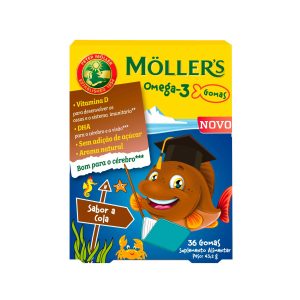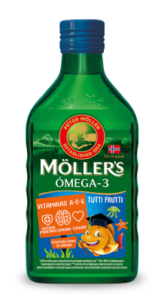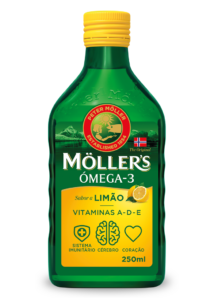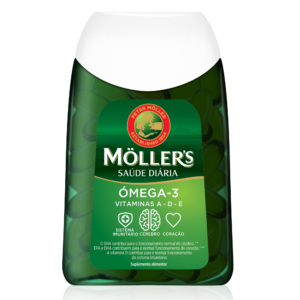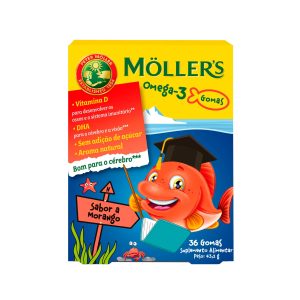Möller’s Cod Liver Oil is not only a good source of omega-3, but also of several vitamins, of which vitamin D is particularly important.
Home » Vitamin D – one of the great benefits of cod liver oil
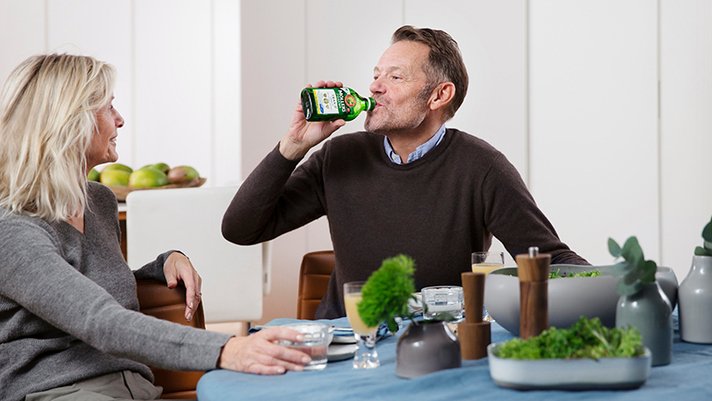
Vitamin D – one of the great benefits of cod liver oil
Vitamin D in cod liver oil
You probably know that cod liver oil is a very good source of omega-3. What you might not know, however, is that a spoonful of cod liver oil also covers the required daily dose of vitamin D. People between 1 and 75 years of age are advised to have a daily intake of 10 μg (micrograms) of vitamin D, while for those over 75 the recommendation is 20 μg.
The importance of cod liver oil and vitamin D
Vitamin D is an important contributor to optimising the body’s uptake of calcium, an important building block of the skeleton. Vitamin D thus has an important role in strengthening the skeleton, throughout life. A deficiency of vitamin D over an extended period of time may lead to deficiency diseases such as osteoporosis in adults and rickets in children. Sufficient vitamin D is therefore important for both young and old.
How much vitamin D is there in Möller’s Cod Liver Oil?
A teaspoon of Möller’s Cod Liver Oil (5 ml) contains 10 μg of vitamin D and thus covers the daily required dose for the majority of the population.
According to the NHS, breastfed babies from birth to 1 year of age should be given a daily supplement containing 8.5 to 10 micrograms of vitamin D. Formula-fed babies shouldn’t be given a vitamin D supplement until they’re having less than 500ml (about a pint) of infant formula a day, as infant formula is fortified with vitamin D.
Vitamin D sources
Vitamin D is present in many of the sources of omega-3 and especially in oily fish, fish roe and fish liver. But there is an almost inexhaustive free source of vitamin D available to everyone, namely the sun. When bare skin is exposed to direct sunlight, the body initiates a process whereby it converts the originators of cholesterol in the skin into vitamin D. This makes vitamin D the only chemical substance classified as a vitamin that the body can produce itself.
Vitamin D from the sun
Depending on where you live, the time of day, the season, your skin tone, and other factors, you can get a vitamin D supply every day by being in direct sunlight. However, most of the skin cannot be exposed in order to get the desired effect. The time it takes to produce sufficient vitamin D is individual and depends on, for example, the factors mentioned above. Here in the Northern Hemisphere, the days are short during winter and it is difficult to expose the body to enough direct sunlight for it to produce sufficient vitamin D.
The NHS advises certain groups of people, who may not be able to benefit from sunlight, to be particularly mindful of their vitamin D intake. These include people who
- are in an institution like a care home
- usually wear clothes that cover up most of your skin when outdoors
- aren’t often outdoors – for example, if you’re frail or housebound
If you have dark skin – for example, you have an African, African-Caribbean or south Asian background – you may also not get enough vitamin D from sunlight.
Vitamin D supplements
Supplements such as Möller’s Cod Liver Oil can be the solution to meet the body’s daily requirement for vitamin D.
One 5 ml teaspoon of Möller’s Cod Liver Oil per day covers the daily requirement for both young and old, while also providing omega-3, vitamin A and E. Vitamin A is particularly important for the eyes and contributes to the body’s immune defence against infections, while some of vitamin E’s most important functions are to protect the cells from oxidative stress.
What is good health?
Do you have a good lifestyle?
Lifestyle simply means the way in which you live. Health and lifestyle go hand in hand. You might feel you have a good lifestyle if you are physically active, eat healthily and generally experience a sense of wellbeing. Conversely, if you want good health you should also have a good lifestyle.
Physical activity is the major contributor to a good lifestyle, but diet, drugs, stress, sleep and social conditions are also play an important role. Being able to use the body properly to avoid injury also affects lifestyle. Physical activity can also prevent depression and help you to recover more quickly from mental illness, both of which obviously affect your lifestyle.
Diet can be a difficult topic for many. Perhaps you eat too much or too little or maybe you find it hard to know what foods to combine to have a balanced diet. It’s also important to eat food that contains important vitamins, minerals and dietary fibre, omega-3 and antioxidants. On top of all this, you also need to get enough energy, protein and the correct fatty acids. The requirement for these nutrients changes throughout your life. When you are older you also have different requirements than children and younger adults. Women also have different requirements than men. Pregnant and breastfeeding mothers also have special requirements.
When you get older, you lose muscle mass and your body requires less energy and therefore less food. You may lead a less active life than you did before, which is why you require less food. However, your need for minerals, vitamins and other nutrients remains the same. Of course, there are plenty of healthy and active older people, but when you reach 70 to 80 years of age, it’s easier to become ill, especially during flu season.
Some steps you can take to improve your lifestyle and health are to:
- eat a healthy and varied diet
- stay active
- watch your weight
- avoid too much alcohol and don’t smoke
- get enough sleep
- think positive
- practise good hygiene
What is good quality of life?
The World Health Organisation (WHO) defines quality of life as a state where the individual can realise their potential, cope with normal stressful situations, work in a rewarding and positive way, and be able to contribute to others and society.
Quality of life is a wide and somewhat diffuse concept that includes joy in, and a desire for, life. These are values that are rather felt than measured, which in turn are based on personal environment and choices. Quality of life doesn’t necessarily depend on being healthy or sick. It’s the moments between worries, sorrows, problems and ailments that matter. For example, if you have a chronic illness, a feeling of mastery can be important when talking about quality of life.
To sum up, quality of life is a combination of health, lifestyle, networks and social support. It’s about experiencing joy, meaning in life, satisfaction, security and a sense of belonging, as well as being able to use your strengths. It’s also about feeling interest in life, coping with everyday situations and a being committed to something or someone. If you have good quality of life, you will be able to cope better with the inevitable stressful situations in life.
Learn more
Programa de exercícios para idosos
Healthy Aging Healthy Bones
Dieta saudável durante a gravidez
Brain Healthy Aging
Boa saúde, estilo de vida e qualidade de vida – O que tudo isso significa?
Cod Liver Oil Healthy Aging
